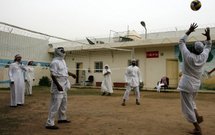
Former Saudi Al-Qaeda Islamists play volleyball at a rehabilitation centre for militants in Riyadh.
"It's about a 9.5-percent relapse" for all 300 Saudi men, including militants arrested by Saudi authorities, who have passed through the "Care Centre," Hadlaq said.
"But it's more than 20 (percent) among Guantanamo guys."
Of those, 10 or 11 are believed reunited with Al-Qaeda in Yemen, four have been killed in anti-Qaeda operations, and the others have been rearrested and jailed, according to interior ministry spokesman General Mansour al-Turki.
The officials blamed most of the recidivism on a close-knit group of more than 10 Guantanamo inmates repatriated to Saudi Arabia on November 9, 2007.
"They created the whole (problem)" said Turki. "Of course they infected a number of previously freed Guantanamo detainees."
There are currently three former Guantanamo detainees in the programme.
The US continues to hold 13 more Saudis at the US navy facility in Cuba and has not yet granted Riyadh's request to return them to their home country.
Hadlaq said the government was still planning to expand the Care programme with new facilities in five cities, with an eye to rehabilitating some of the more than 2,000 Saudis currently imprisoned on charges linked to Al-Qaeda and other Islamic militant activities.
Hadlaq, meanwhile, played down fears echoing through the Saudi media that Saudi women were being recruited by Al-Qaeda in growing numbers.
Such reports surfaced after the arrest of Heila al-Qusayer, allegedly a key woman operative in a recently busted militant cell in the central Qassim region.
"There are very isolated cases, very few cases before her," said Hadlaq.
Qusayer is the widow of a Saudi Al-Qaeda activist killed six years ago by the authorities.
Her name became known earlier this month when a leader of the Yemen-based Al-Qaeda on the Arabian Peninsula threatened to kidnap members of the ruling Saudi royal family if she was not freed.
The Dubai-based news channel Al-Arabiya described Qusayer, one of 113 suspects whose arrests were announced on March 24, as "the most dangerous woman" in Al-Qaeda in Saudi Arabia.
-------------------------------------------------------------------------------
"But it's more than 20 (percent) among Guantanamo guys."
Of those, 10 or 11 are believed reunited with Al-Qaeda in Yemen, four have been killed in anti-Qaeda operations, and the others have been rearrested and jailed, according to interior ministry spokesman General Mansour al-Turki.
The officials blamed most of the recidivism on a close-knit group of more than 10 Guantanamo inmates repatriated to Saudi Arabia on November 9, 2007.
"They created the whole (problem)" said Turki. "Of course they infected a number of previously freed Guantanamo detainees."
There are currently three former Guantanamo detainees in the programme.
The US continues to hold 13 more Saudis at the US navy facility in Cuba and has not yet granted Riyadh's request to return them to their home country.
Hadlaq said the government was still planning to expand the Care programme with new facilities in five cities, with an eye to rehabilitating some of the more than 2,000 Saudis currently imprisoned on charges linked to Al-Qaeda and other Islamic militant activities.
Hadlaq, meanwhile, played down fears echoing through the Saudi media that Saudi women were being recruited by Al-Qaeda in growing numbers.
Such reports surfaced after the arrest of Heila al-Qusayer, allegedly a key woman operative in a recently busted militant cell in the central Qassim region.
"There are very isolated cases, very few cases before her," said Hadlaq.
Qusayer is the widow of a Saudi Al-Qaeda activist killed six years ago by the authorities.
Her name became known earlier this month when a leader of the Yemen-based Al-Qaeda on the Arabian Peninsula threatened to kidnap members of the ruling Saudi royal family if she was not freed.
The Dubai-based news channel Al-Arabiya described Qusayer, one of 113 suspects whose arrests were announced on March 24, as "the most dangerous woman" in Al-Qaeda in Saudi Arabia.
-------------------------------------------------------------------------------









 Home
Home Politics
Politics









